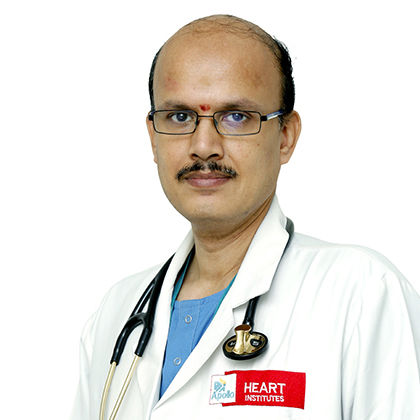Causes of Atrial Fibrillation Explained
Explore the causes of atrial fibrillation, including high blood pressure, heart disease, sleep apnea, and lifestyle factors. Understand what triggers this irregular heartbeat and how to manage your risk.

Written by Dr. Rohinipriyanka Pondugula
Reviewed by Dr. D Bhanu Prakash MBBS, AFIH, Advanced certificate in critical care medicine, Fellowship in critical care medicine
Last updated on 13th Jan, 2026

Atrial fibrillation (AFib) is a common heart condition where the heart beats irregularly and often too fast. It happens when the upper chambers of the heart (the atria) beat chaotically instead of in a steady rhythm. This can lead to poor blood flow and increase the risk of complications like stroke or heart failure.
If you or a loved one has been diagnosed with AFib, you might wonder what causes it and how to manage it. In this article, we’ll explain the common causes of atrial fibrillation in simple terms and provide helpful tips for managing the condition.
What Causes Atrial Fibrillation?
Several factors can contribute to AFib, including underlying health conditions, lifestyle choices, and genetic factors. Here are the most common causes:
1. High Blood Pressure (Hypertension)
High blood pressure puts extra strain on the heart, making the atria work harder. Over time, this can damage the heart muscle and lead to irregular heartbeats.
2. Heart Disease
Conditions like coronary artery disease (narrowed heart arteries), heart valve problems, or a previous heart attack can increase the risk of AFib.
3. Age
The risk of AFib increases with age, especially after 60, as the heart’s electrical system weakens over time.
4. Obesity
Excess weight puts stress on the heart and can lead to structural changes that trigger AFib.
5. Diabetes
High blood sugar levels can damage blood vessels and nerves, increasing the risk of irregular heart rhythms.
6. Thyroid Disorders
An overactive thyroid (hyperthyroidism) can disrupt the heart’s normal rhythm and lead to AFib.
7. Excessive Alcohol or Caffeine
Heavy drinking (especially binge drinking) and too much caffeine can trigger AFib episodes in some people.
8. Sleep Apnea
This condition, where breathing stops and starts during sleep, reduces oxygen levels and strains the heart, increasing AFib risk.
9. Chronic Lung Diseases
Conditions like COPD (chronic obstructive pulmonary disease) can affect heart function and contribute to AFib.
10. Family History
If a close family member has AFib, you may have a higher risk of developing it too.
Consult Top Heart Specialists
How Does AFib Affect Your Health?
Atrial fibrillation may not always cause noticeable symptoms, but some people experience:
Palpitations (a racing, fluttering, or pounding heartbeat)
Fatigue or weakness
Dizziness or lightheadedness
Shortness of breath
Chest discomfort
If left untreated, AFib can lead to serious complications like:
Stroke (due to blood clots forming in the heart)
Heart failure (the heart becomes too weak to pump blood effectively)
Chronic fatigue (due to poor blood circulation)
Tips to Manage Atrial Fibrillation
While some causes of AFib (like age or genetics) can’t be changed, many lifestyle adjustments can help reduce symptoms and lower the risk of complications:
1. Control Blood Pressure
Monitor your blood pressure regularly.
Follow a low-salt diet and take prescribed medications if needed.
2. Maintain a Healthy Weight
Eat a balanced diet rich in fruits, vegetables, and whole grains.
Exercise regularly (walking, swimming, or yoga can help).
3. Limit Alcohol and Caffeine
Avoid excessive alcohol (more than 1 drink per day for women, 2 for men).
Reduce caffeine if it triggers palpitations.
4. Manage Stress
Practice relaxation techniques like deep breathing or meditation.
Get enough sleep (7-9 hours per night).
5. Treat Underlying Conditions
Keep diabetes under control with diet, exercise, and medications.
If you have sleep apnea, use a CPAP machine as recommended.
6. Stay Hydrated
Dehydration can trigger AFib, so drink enough water daily.
7. Avoid Smoking
Smoking damages blood vessels and worsens heart health.
When to See a Doctor?
Seek medical help immediately if you experience:
Frequent heart palpitations
Unexplained dizziness or fainting
Severe chest pain or shortness of breath
Early diagnosis and treatment can prevent complications.
How Apollo 24|7 Can Help?
If you suspect you have AFib or need expert advice, Apollo 24|7 offers:
Cardiology consultations with experienced doctors
Heart health tests (ECG, Holter monitoring, echocardiogram)
Personalised treatment plans
You can easily book a consultation or schedule a test through the Apollo 24|7 app or website.
Conclusion
Atrial fibrillation is a manageable condition when detected early. By understanding its causes and making healthy lifestyle changes, you can reduce symptoms and improve your heart health. If you have concerns about AFib, don’t hesitate to consult a doctor for guidance.
Consult Top Heart Specialists
Consult Top Heart Specialists

Dr. L Kiran Kumar Reddy
Cardiologist
15 Years • MBBS,MD, Gen Med (KMC) DM Cardiology (JIPMER)
Hyderabad
Apollo Medical Centre Kondapur, Hyderabad

Dr. Deepesh Venkatraman
Cardiologist
10 Years • MBBS, MD (Gen Med), DM (Cardio), DNB (Cardio)
Chennai
Apollo Medical Centre Kotturpuram, Chennai

Dr. Anand Ravi
General Physician
2 Years • MBBS
Bengaluru
PRESTIGE SHANTHINIKETAN - SOCIETY CLINIC, Bengaluru

Dr. Srinivasan K N
Cardiologist
11 Years • MD, DNB (Cardio)
Chennai
Apollo Hospitals Greams Road, Chennai
(200+ Patients)
Dr. Raman Puri
Cardiologist
29 Years • MD, DM
Delhi
Apollo Hospitals Indraprastha, Delhi




